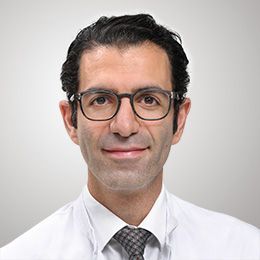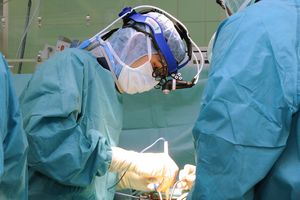
Chefarzt Orthopädie und Wirbelsäulenchirurgie
Leiter Universitäres Wirbelsäulenzentrum
The spine is a key component of the human body. With highly experienced specialists, the spine surgery team focuses on the conservative and surgical treatment of diseases and injuries of the spinal column.
Our goal is to provide patients with the best possible support. Where the spine is concerned, decisions for surgery have to be considered particularly carefully, taking all relevant factors and the prognosis into account.
Whenever an operation is necessary, our highly experienced spine surgeons, led by Prof. Mazda Farshad, employ state-of-the-art surgical techniques. As a university hospital, all the units involved in treatment (surgery, neurology, anesthesia, radiology, nursing care, physiotherapy etc.) specialize in the tertiary care of problems affecting the musculoskeletal system and the spine.
Besides treating degenerative changes in the entire spine, the team operates on conditions in the neck, childhood deformities, and tumors. The team also deals with spines that have been operated on previously. We work together with neurologists at the Spinal Cord Injury Center, who specialize in conditions affecting the spinal cord. This close cooperation, unique to Zurich, allows us to carry out accurate work-ups and, whenever necessary, monitor the spinal cord and nerves during operations.
The Department of Spine Surgery specializes in:

Whenever an operation is necessary, our highly experienced spine surgeons, led by Prof. Mazda Farshad, employ state-of-the-art surgical techniques. All the units involved in treatment (surgery, neurology, anesthesia, radiology, nursing care, physiotherapy etc.) specialize in the tertiary care of problems affecting the spine.
Quality control, innovation, a scientific approach, continuously developing the latest findings and employing cutting-edge technology are standard in this hospital. As a university department of spine surgery, we take our responsibilities for evidence-based medicine in the investigation and treatment of our patients very seriously and, as a tertiary care hospital, we perform extremely complex procedures on the spine.
A prolapsed (herniated) disc in the lumbar spine is the most common cause of back problems. Strain on the vertebral disc causes tears in the outer ring of cartilage, through which the gel-like inner contents of the disc can protrude, compress a nerve, and lead to inflammation. The resultant pain in the legs may be very severe and there may be associated disorders of sensation and paralysis.
Almost as soon as it has finished growing, the lumbar spine is affected by aging and signs of wear and tear, such as a reduction in the disc spaces and osteoarthritis. These changes may lead to lower back pain or pain in the legs. An operation to stabilize the spine is recommended if the pain cannot be relieved by a decompression procedure.
Scoliosis (curvature of the spine) means that the spine curves sideways and is usually rotated around its longitudinal axis. This causes an asymmetry of the upper body with one shoulder higher than the other and a rib or lumbar hump. The risk of progression is linked to the size of the curve. In the long term, it will cause a functional disorder of the lungs and pain.